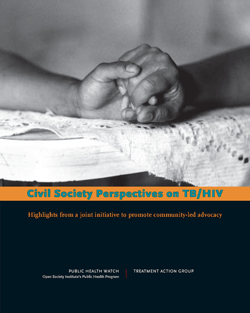Download:

Published 2006
This publication is cosponsored by the Open Society Institute, a private operating and grantmaking foundation whose aim is to shape public policy in order to promote democratic governance, human rights, and economic, legal, and social reform, and the Treatment Action Group, the fi rst and only AIDS organization dedicated solely to advocating for larger and more effi cient research efforts, both public and private, toward fi nding a cure for the disease.
Introduction
OVER THE PAST TWO DECADES, the HIV epidemic has contributed to a global resurgence of tuberculosis (TB). HIV weakens the immune system, greatly reducing an individual’s ability to fi ght off serious coinfections such as TB, as well as many opportunistic infections. In some high HIV-burden African countries, up to 50 percent of HIV-positive people develop active TB, and TB is now among the most common causes of death by infectious disease among people living with HIV. It makes little sense from any perspective—public health, human rights, social or legal—to confront the two diseases separately. Yet there have been too few collaborative responses from HIV/AIDS and TB programs. In many countries, national TB and HIV/AIDS programs and policies are designed and implemented independently of each other. Lack of coordination greatly reduces access to comprehensive treatment and prevention services for people living with HIV and/or TB.
In recognition of these limitations, the World Health Organization (WHO) adopted its Interim Policy on Collaborative TB/HIV Activities in 2004. The TB/HIV Policy provides guidelines on measures that can be coordinated jointly by national HIV/AIDS programs and national TB programs to reduce the burden of TB among people with HIV and the burden of HIV among TB patients. It emphasizes the importance of building upon existing programs, systems, and resources, and of involving governments, health care providers, patients, and communities in designing and implementing a collective response to the dual epidemic. The TB/HIV Policy explicitly recognizes community-led monitoring and advocacy as an important way to promote and increase public demand for accelerated and improved TB/HIV services.
The Open Society Institute (OSI) and the Treatment Action Group (TAG) jointly launched a TB/HIV Advocacy Grants Project in 2004 to encourage implementation of this important component of the TB/HIV Policy. The project aimed to provide funding and technical assistance in support of community-led advocacy for more effective and coordinated TB/HIV programs and services.
With assistance from a Community Advisory Committee of seven TB/HIV activists from around the world, the project awarded 31 grants to community organizations in 21 countries. Grantmaking focused on promoting more attention to TB by activists and organizations with proven expertise and experience with HIV/AIDS treatment literacy and advocacy. Special priority was given to groups that integrated signifi cant participation from people living with HIV into their project plans. The TB/HIV advocacy grants supported implementation of both “top down” and “bottom up” approaches to advocacy, always prioritizing the direct involvement of people living with HIV and/or TB.
